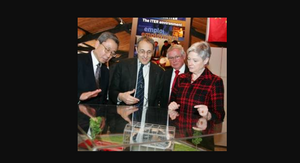Dutch Minister Van der Hoeven visits ITER
Maria Van der Hoeven, Minister of Economic Affairs of the Netherlands, along with a large delegation of Dutch captains of industry was at the Chateau de Cadarache on Tuesday, 19 February 2008, to learn about progress on ITER.
The Netherlands are keen proponents of fusion and this interest is due in no small part to the prominent role played by Minister Van der Hoeven during the Dutch presidency of the EU when ITER site negotiations were at a critical stage.
Presentations on ITER were made to the Minister by Director-General Ikeda, Bernard Bigot, ITER High commissioner to the French Government and Didier Gambier, Director of the European Domestic Agency. "We'll have to take the long view to make this process work. Sustainable energy sources such as fusion are vital to the survival of the planet. And that is why ITER is so important, and why it is so encouraging that scientists and engineers from all over the world are cooperating here to solve the difficult puzzles associated with fusion technology," said the Minister.
In parallel with the Minister's visit business meetings were set up to enable the Dutch industrialists to meet with potential French partners for collaborations on ITER contracts: some 75 "get- togethers" were organized.


